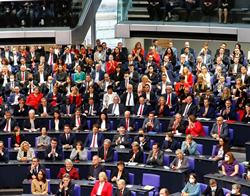 The German Government is seeking to reduce the size of the Upper House of Parliament, the Bundestag — something its predecessors have tried, and failed, to do over many years.
The German Government is seeking to reduce the size of the Upper House of Parliament, the Bundestag — something its predecessors have tried, and failed, to do over many years.
With 736 members, the Bundestag is larger than any other democratically-elected Parliament.
Only the Chinese National People’s Congress and the unelected House of Lords in the United Kingdom are larger.
This is due to a complicated electoral system, German voters get two votes in their Federal elections, one for the Deputy representing their constituency, and one for their preferred party.
This means the parties in the Bundestag are represented by both directly-elected Parliamentarians and those taken from party ‘lists’.
The second vote determines the size of a party in the Bundestag, but each directly elected representative is also entitled to a seat.
Thanks in part to the recent rise of smaller parties and the decline in support for the big ones, this system has meant the Parliament has grown from a minimum of 598 seats to its current 736.
According to several opinion polls, a majority of Germans think the Parliament is too big — and too expensive.
The 2023 Federal Budget earmarked around €1.4 billion ($A2.25 billion), including all ancillary costs, for the Bundestag.
For more than a decade there have been attempts to shrink the Parliament, but they have all failed, partly because the MPs themselves have to decide on the reduction.
All parties see the need for downsizing, but at the same time they are scrupulously careful not to be disadvantaged if there is a reform.
Berlin, 17 March 2023











